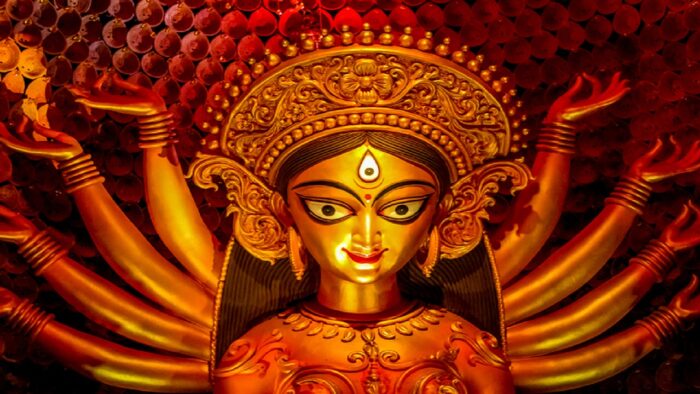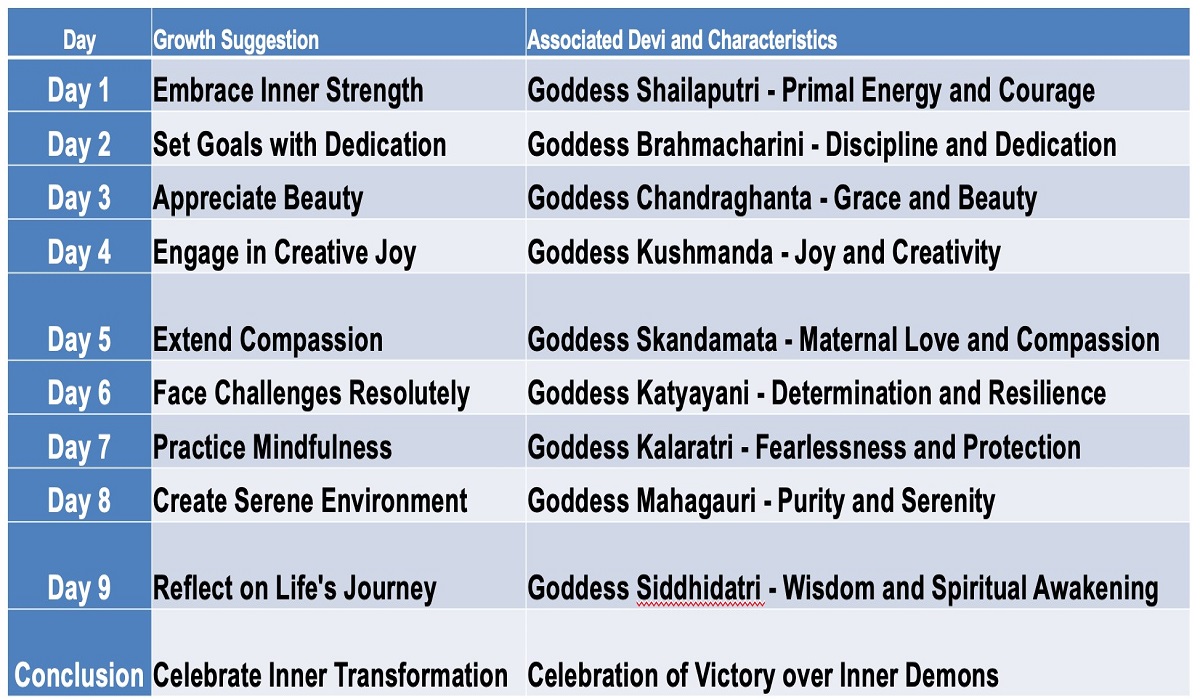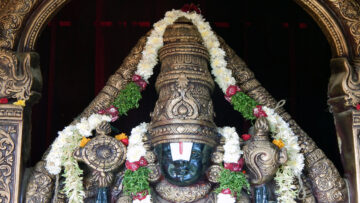Introduction
In a world often filled with hustle and bustle, taking time for inner reflection and personal growth can be a deeply enriching experience. While an individual may or may not be familiar with Indian traditions like Devi Navaratri, they can still embark on a meaningful journey of self-discovery and self-improvement by connecting with their emotions and inner qualities. During Navaratri, Hindus worship Feminine Energy as the Divine Devi and celebrate it through multiple rituals, prayers and reflections. In this article, we will explore how to celebrate personal growth and emotional well-being by embracing the qualities associated with each day, just as Devi Navaratri does.
(Table 1: Growth Suggestion for Each Day)
This table provides a concise overview of the daily suggestions for people who are not familiar with Hindu festival of Devi during the nine days of celebration, along with the associated Goddesses and their characteristics. It serves as a helpful reference to align personal growth practices with the festival’s essence.
Day 1 – Pratipada: Strength and Courage
- Morning Ritual: Begin your day with a moment of reflection on your inner strength and courage. Think of a challenge you’ve overcome in the past, and acknowledge the strength within you.
- Significance: Today is about recognizing the resilience that resides within all of us. By acknowledging your inner strength, you set the tone for personal growth.
Day 2 – Dwitiya: Discipline and Dedication
- Morning Ritual: Take a few moments to reflect on your goals and aspirations. Consider what disciplines and habits will help you achieve them.
- Significance: Discipline is a cornerstone of personal growth. By setting intentions and dedicating yourself to your goals, you nurture the path to self-improvement.
Day 3 – Tritiya: Grace and Beauty
- Morning Ritual: Spend some time appreciating the beauty around you. It could be a natural landscape, a work of art, or the smile of a loved one.
- Significance: Beauty and grace are qualities that enrich our lives. By immersing yourself in the beauty of the world, you cultivate a sense of gratitude and joy.
Day 4 – Chaturthi: Joy and Creativity
- Morning Ritual: Connect with the joy of Goddess Kushmanda. Express gratitude for the creative energy within you.
- Significance: Goddess Kushmanda’s creative power is the source of joy in our lives. By expressing gratitude, we align ourselves with the joy that arises from creativity, whether in art, relationships, or personal growth.
Day 5 – Panchami: Maternal Love and Compassion
- Morning Ritual: Meditate on the maternal love of Goddess Skandamata. Reflect on your capacity for compassion and caring.
- Significance: Goddess Skandamata’s love for her son, Lord Kartikeya, exemplifies maternal love. By contemplating this love, we become more compassionate beings, extending our care to others.
Day 6 – Shashthi: Determination and Resilience
- Morning Ritual: Embrace the determination of Goddess Katyayani. Set goals for personal growth and transformation.
- Significance: Goddess Katyayani’s determination led her to defeat the demon Mahishasura. By harnessing her determination, we take on challenges with unwavering resolve, fostering personal growth.
Day 7 – Saptami: Fearlessness and Protection
- Morning Ritual: Meditate on the fearlessness of Goddess Kalaratri. Release fears and anxieties through mindfulness.
- Significance: Goddess Kalaratri embodies fearlessness. By practicing mindfulness, we overcome inner fears and anxieties, becoming a source of strength for ourselves and others.
Day 8 – Ashtami: Purity and Serenity
- Morning Ritual: Connect with the purity and serenity of Goddess Mahagauri. Reflect on inner peace and cleansing.
- Significance: Goddess Mahagauri represents purity and serenity. By purifying our physical and mental spaces, we create room for inner serenity through practices like decluttering and meditation.
Day 9 – Navami: Wisdom and Spiritual Awakening
- Morning Ritual: Meditate on the wisdom of Goddess Siddhidatri. Seek spiritual guidance and wisdom from within.
- Significance: Goddess Siddhidatri is the bestower of wisdom and spiritual awakening. By diving into spiritual practices like meditation and prayer, we tap into our inner wisdom and elevate our consciousness.
Conclusion
While one may not be too familiar with Devi Navaratri, the principles of personal growth and emotional well-being are universal. Embracing these qualities initiates a journey of self-improvement and inner transformation. Just as Devi Navaratri celebrates the divine feminine and its qualities, individuals too can celebrate their inner qualities and emotions, fostering a sense of fulfillment and growth in their lives.
As we celebrate personal growth, may these days be a meaningful and transformative experience, regardless of our cultural background or traditions.
Acknowledgments
I wish to acknowledge the Institute of Indic Wisdom group, as well as individuals from the Open Space Conference in Siddhabhari, for their support and inspiration. For this article, my heartfelt appreciation to Kewal Nohria, Dr. Ritu Anand, Dr. Shalini Sarin, Gagan Singh, Vijay Kumar Jamwal, Anil Sachdev, and Susie Roy.
Feature Image Credit: dreamstime.com
This article has already been published on LinkedIn. We have reproduced it upon the author’s permission.
Disclaimer: The opinions expressed in this article belong to the author. Indic Today is neither responsible nor liable for the accuracy, completeness, suitability, or validity of any information in the article.










